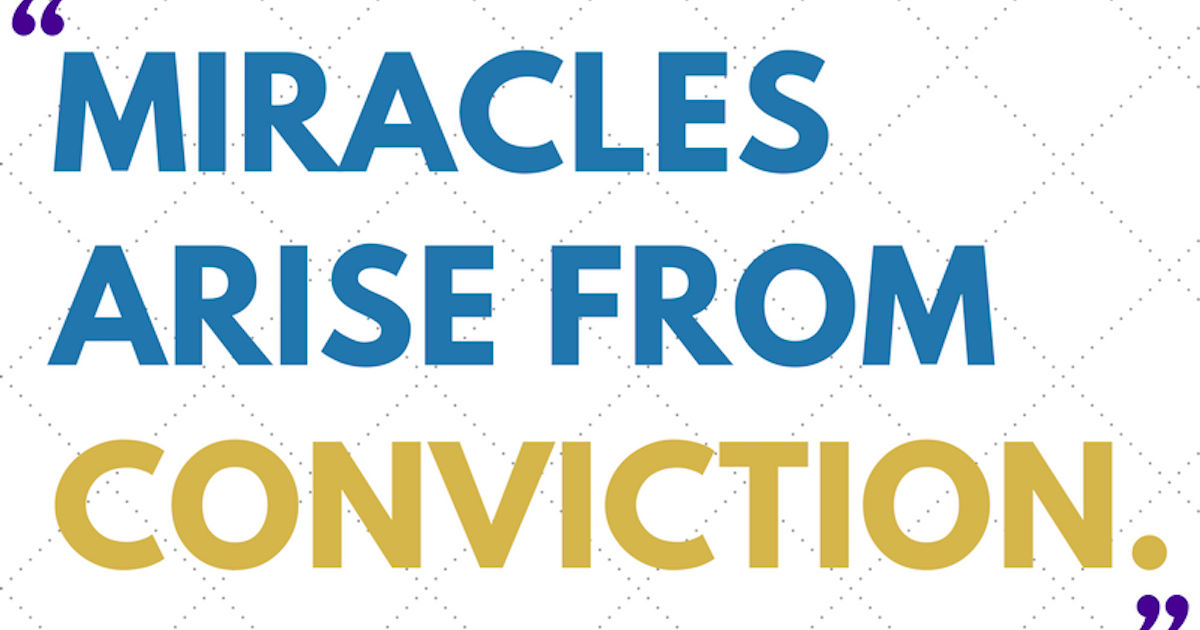It took me a long time to get conviction, and I want to understand why.
After all, miracles arise from conviction, and we definitely need more miracles.
So why aren’t more of us more convicted in the name of love?

“Conviction” is a confusing word
The primary contexts I associate with the term “conviction” are criminality (being deemed Guilty by the Law) and evangelical Christianity (also Guilty, but per God).
Neither association is particularly inspiring or uplifting.
Yet if we scroll to the third definition in Merriam-Webster’s, we find the stuff of miracles:
conviction: a strong persuasion or belief // a state of being convinced
So, first comes guilt, then more guilt, and then the audacity of being certain.
No wonder it has taken me so long to claim my convictions.
Sometimes being guilty is good
By all means, find me guilty of caring about my country. Convict me of believing in love.
When it comes to being sure that only love is real, that fear is of the ego, that we have what it takes to truly change the world: consider me convicted.
And yes, yes, yes, I am willing to stand up for what is right. Even when it is inconvenient.*
*Though I am also guilty of wanting the work of healing the world to be more convenient.
So why is it so hard to speak up and take action?
If you get my #thankyouthursday emails or read my weekly gratitude posts on the regular, you know that in the last year or so, I have begun more clearly voicing my views.
As a trained journalist who grew up suppressing her feelings, learning to boldly state my opinion—indeed, my convictions—has been a gradual process.
In my early 20s, I was perhaps too brash; I made statements the Internet will never let me take back.
In my late 20s, I was certainly careful; I talked exclusively about yoga, which seemed pretty safe.
By the time I hit 30, I’d written a book about dating, which prompted some related articles that broadened my range of permissible subjects.
But it’s only since last July that I’ve been brave enough to publicly acknowledge and condemn police brutality and systemic racism.
Even now, I write about topics like nail polish and coffee addiction at least as often as I talk about nonviolence and vitally important fiction.
Why the hesitation?
We can’t afford to be afraid
One reason I’m not more emphatic more often is that I’ve worried I will push people away.
My readers come to me for lighthearted reminders about gratitude, or sometimes for spiritual guidance.
No one signed up to hear me be serious about our nation’s ails. Or so I assume.
And so what?
First of all, assumptions are largely unhelpful.
Secondly, for me to worry what you think is to give in to fear—is to fall prey to ego instead of claiming love.
Our nation is ailing, and I care, and I know what we can do about it.
It’s okay if you aren’t interested. You don’t have to read this. Go ahead and unsubscribe from my emails. Stop clicking on my posts.
Because I need to be here for people who want to make a difference, and we can’t afford to be afraid.
We don’t have to know what to say
Another reason I’m less vocal than I could be is that for a long, long time, I worried about being wrong.
What if I misstate a fact? (In journalism school, we got an F if we did that.)
What if I proclaim a belief and later change my mind?
The world will go on, that’s what.
I can acknowledge my mistakes, my shifts, my evolutions.
I am allowed to be human, and so are you.
But I do not believe I am allowed to be silent. Not when I have the ability and privilege to speak freely.
And because it’s not about me anyway, I don’t have to know what to say.
I just have to know how to listen: to what others are sharing, yes, but especially in stillness.
When I sit still, I hear truth. Words come. So does love.
I can let love lead.
Haters have conviction. Lovers need it too.
I am developing a healthy obsession with Marianne Williamson and the text she teaches, which is A Course in Miracles.
I love how fearlessly—yet kindly—she critiques spiritual seekers.
During this Tuesday’s lecture, she juxtaposed do-gooders with terrorists and explained why hate seemed to be winning.
“So what’s happening, is, A Course in Miracles says, miracles arise from conviction.
Those who hate on this planet today are small in numbers compared to those who love, but those who hate, hate with conviction. The problem isn’t the numbers, here.
The problem is that those who hate, hate with a conviction that is not quite yet being displayed by those of us who love.
Right now, we sorta kinda love, you know, when it’s convenient—not Friday, ’cause I’m busy.”
Her assessment rings true, and that’s okay. Once we see the sin, we can atone and act anew.
In other words, each day is a fresh opportunity to be better.
And when we love with conviction—all the time, full-on—we make way for miracles.
In the spirit of conviction, a confession
I’m about due for a break from social media. Specifically, Facebook.
It’s one of my last lingering addictions, and even though it is ultimately a source of gratitude, lately it has been getting in the way of my growth.
And yet.
Sunday night I was scrolling my feed for the first time in a few days, and I learned about the NFL protests.
Before I knew what my fingers were doing, I was typing a Facebook post about my personal experience with taking a knee.
I expressed my convictions with no hesitation, and certainly no expectation. I simply wished to offer perspective, and to show solidarity with my words.
And wouldn’t you know, that post got more reactions than maybe anything I’ve ever written.
Not a miracle, exactly, but proof enough that each of us is capable of impact.
I’m no Colin Kaepernick.
But I am definitely my own unique self, and I do have a purpose, and my actions do affect others.
This is true for all of us.
So let’s act with conviction, borne of love, and clear the path for positive change.
Love > fear,
![]()
p.s. Like the ideas in this post but don’t know where to start? Email me at christina[at]christinabryza.com. Let’s talk.

